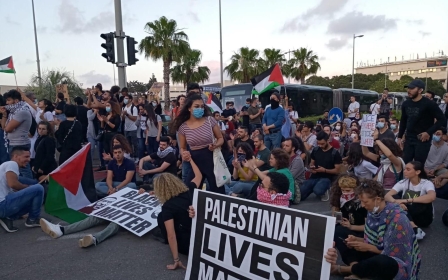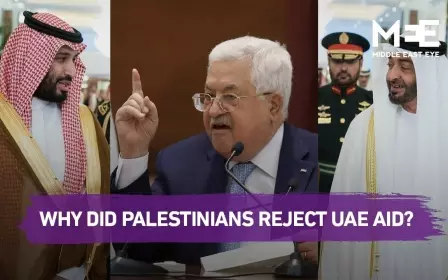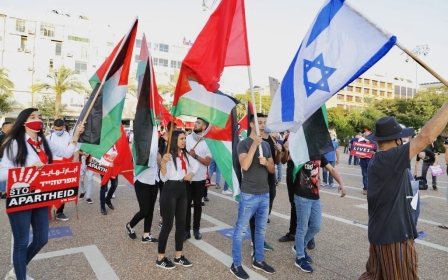Former leader of Palestinian Islamic Jihad buried in Syria
The former leader of the Palestinian Islamic Jihad movement Ramadan Shalah was buried in the Syrian capital Damascus on Sunday.
Shalah, 62, died on Saturday in a Beirut hospital following an unspecified illness, before his body was transported to Yarmouk Palestinian refugee camp near Damascus, where he wished to be buried.
Dozens of mourners, including the current leader of the Islamic Jihad, Ziyad Nakhla, participated in the funeral despite the ongoing coronavirus pandemic.
A symbolic funeral procession was meanwhile held in the besieged Gaza Strip, Shalah’s birthplace, on Sunday. Crowds in Gaza City included representatives from Fatah, Hamas and other Palestinian factions.
Hamas, the de facto ruling party in Gaza, was unable to bring Shalah’s body home for burial in Gaza due to an Israeli ban on his entry into occupied Palestinian territories “whether dead or alive”.
New MEE newsletter: Jerusalem Dispatch
Sign up to get the latest insights and analysis on Israel-Palestine, alongside Turkey Unpacked and other MEE newsletters
Life and political engagement
Shalah was born in 1958 in the Shujaiya neighbourhood of the Gaza Strip.
He obtained his bachelor’s degree in economics from Zagazig University in Egypt in 1981.
Shalah contributed to the formal founding of the Islamic Jihad in Palestine in 1981, and assumed a number of roles within the movement until he became its leader following Israel’s assassination of former secretary general Fathi al-Shaqaqi in 1995.
Upon completion of his degree in Egypt, he returned to Gaza and worked as an economics lecturer at the Islamic University there, but landed in the crosshairs of the Israeli army and was put under house arrest in 1983.
In 1986, he travelled to the United Kingdom to continue his studies, and obtained a doctorate in economics from the University of Durham in 1990.
He moved to the United States in the early 1990s, where he taught as a professor of Middle Eastern studies at the University of South Florida between 1993 and 1995, after which he left for Syria once he took over leadership of the movement following Shaqaqi's death.
Shalah was designated a terrorist by Israel and the United States in 1995. In 2006, the FBI listed Shalah among its "most wanted terrorists", offering $5m for information leading to his arrest.
Israel accused Shalah of orchestrating a number of attacks against the Israeli army during the Second Intifada between 2000 and 2005.
Shalah handed over leadership of the Islamic Jihad in Palestine to Nakhla in 2018 after suffering from a series of strokes.
Local and regional reactions
Palestinian and regional political figures have eulogised Shalah, with the Islamic Jihad in a statement bidding farewell to "the great leader whose history... we recall since the founding of the Jihad movement".
Walid al-Qutti, a member of the Islamic Jihad politburo, called Shalah one of the members of the “Islamic vanguard” establishing the movement in Egypt, calling for the establishment of a sovereign Palestinian state based on Islamic values.
Qutti credited Shalah for reviving the movement in the mid-1990s and leading a number of military operations during the Second Intifada.
"The movement avoided internal conflicts, and escaped the internal and Arab conflicts that emerged during the Arab Spring” under Shalah’s leadership, Qutti said, adding that Shalah fiercely opposed normalisation of relations with Israel and called for Palestinian national unity to end the occupation.
Palestinian Authority (PA) President Mahmoud Abbas, based in the West Bank, paid tribute to Shalah as “a great national figure”.
The Hamas movement issued a statement calling Shalah a "model of patience and adherence to his steadfast national positions". Meanwhile, Popular Front for the Liberation of Palestine (PFLP) leader in Gaza, Hani al-Thawabta, hailed Shallah for pushing for intra-Palestinian unity.
Iranian Foreign Minister Mohammad Javad Zarif said he was "deeply affected" by the loss of Shalah following a life spent fighting for the "holy Palestinian cause".
In a message from his office to "the brave Palestinians", Zarif hailed Shalah as a "pragmatic, intellectual, serious and intelligent person" who sought "unity between people from different backgrounds, between Palestinian groups and within the Muslim world".
AFP contributed reporting.
Middle East Eye delivers independent and unrivalled coverage and analysis of the Middle East, North Africa and beyond. To learn more about republishing this content and the associated fees, please fill out this form. More about MEE can be found here.




